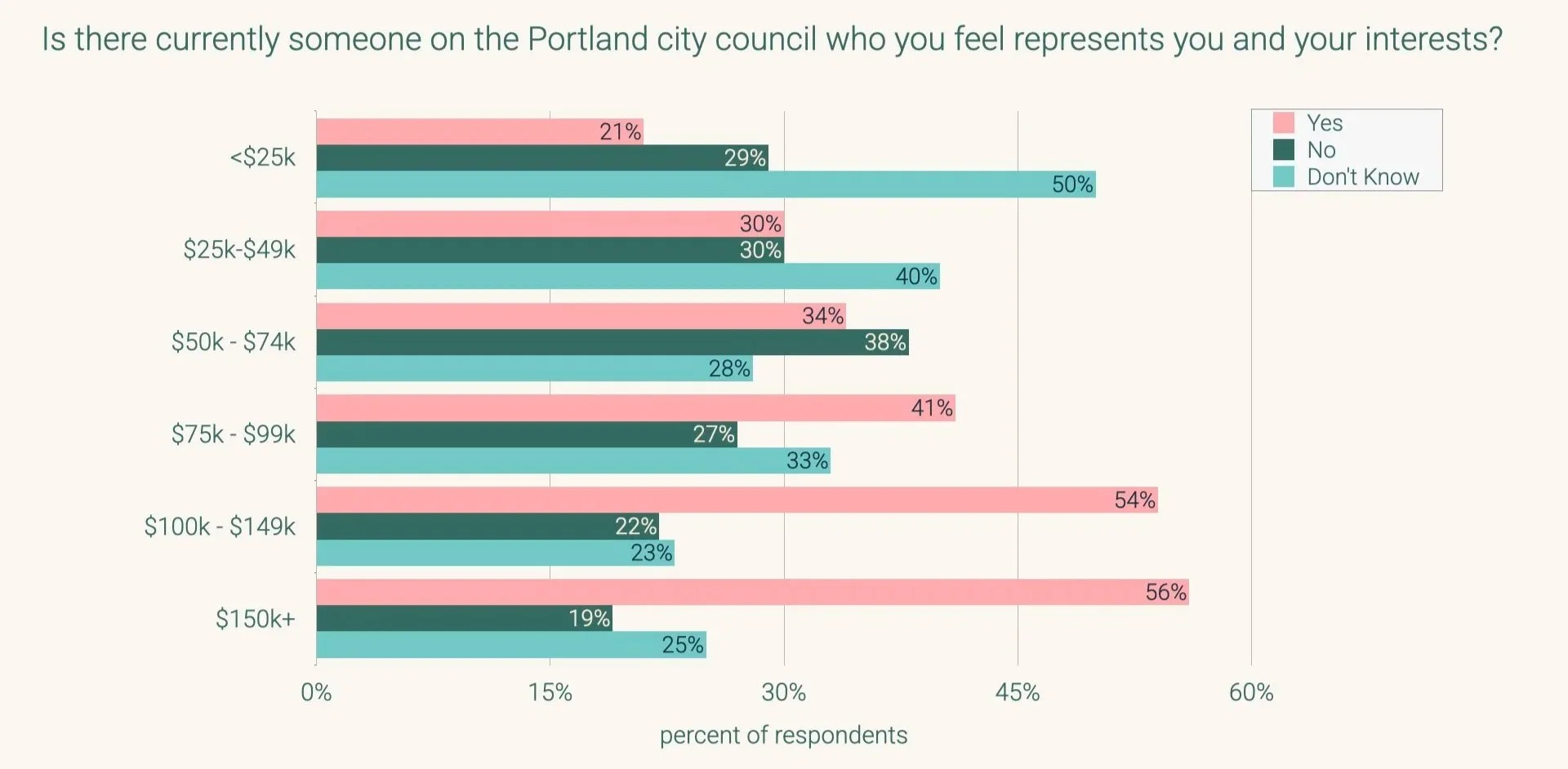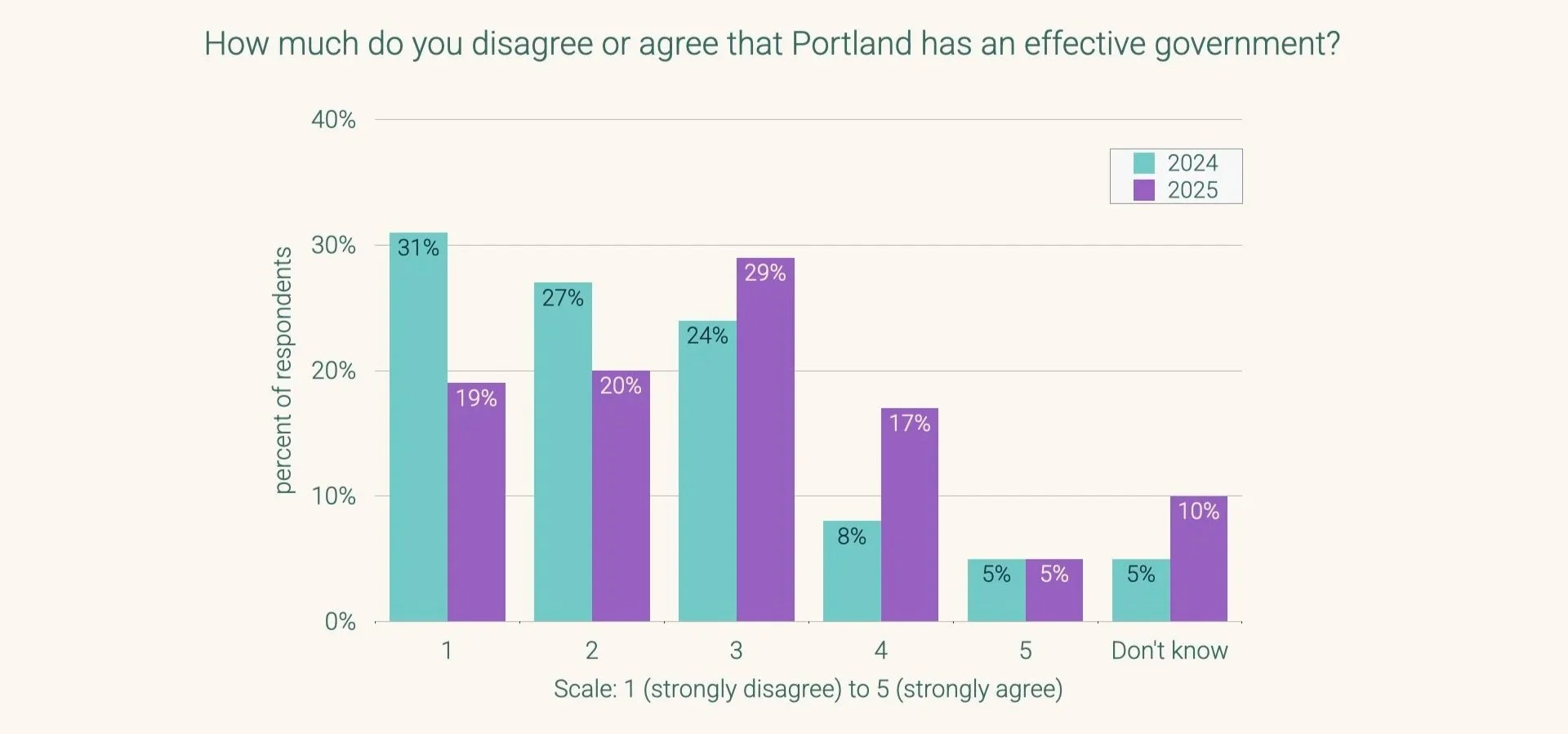city council representation + government efficacy: what portlanders say
This May, Oregon Values and Beliefs Center opened its 2nd annual “Your City, Your Choice Survey” to hear directly from Portland residents about their feelings on the city’s past, present, and future. The survey offers a snapshot of Portland’s perspective on essential questions: What’s working? What’s not?
This year’s responses can also serve as a stress test of Portland’s recent governance changes. Just 5 months into the city’s transition to a more geographically representative City Council, elected via ranked-choice voting, respondents hinted at the merit of these changes.
Firstly, 40% of survey participants believe that there is currently someone on the City Council who represents their interests, an increase from 23% in 2024. This is a significant shift in just one year. Furthermore, the share of Portlanders who either agree or strongly agree that Portland has an effective government has increased from 13% last year to 22% this year. These results indicate greater optimism about City government.
However, feelings of representation on City Council are not consistent across demographic groups – they vary by geography and socioeconomic status. Coming in slightly behind the city average of 40%, just 33% of District 1 respondents feel represented by a Councilor. There were also steep drop-offs related to income and education.
Lower-income Portlanders are noticeably less likely to feel represented by City Council than higher-income Portlanders. 56% of respondents earning more than $150,000 annually report feeling represented — the highest proportion of any income group. From there, reported feelings of representation fall steadily to only 21% of Portlanders earning less than $25,000 annually (note: this is still a significant improvement from 2024, when just 6% of those earning less than $25,000 said they felt represented).
The lowest income groups were also more likely to report uncertainty around whether or not they felt represented. When asked “is there currently someone on the Portland City Council who represents you?” 40% of those earning $25,000-$49,999 annually answered “don’t know.” 50% of those earning less than $25,000 annually were similarly unsure. By contrast, Portlanders earning more than $50,000 were more likely to respond either “yes” or “no.”
There was also a significant divide among education levels. A slight majority of college graduates (53%) feel represented, whereas 34% of those with some college experience and just 19% who did not attend college feel the same. Similarly to Portlanders earning less than $25,000 annually, almost half (49%) of those with no college experience “don’t know” whether they feel represented.
The high number of uncertain responses from respondents who earn less than $50,000 annually or who do not have a college degree suggests a need for more tailored, intentional voter outreach and engagement among these groups.
Generally, survey respondents believe Portland’s current government is more effective compared to 2024. When asked, “How much do you disagree or agree that Portland has an effective government?” 22% of survey respondents answered with some level of agreement, whereas the previous year, just 13% did the same. The most pronounced difference, however, is that the proportion of “strongly disagree” responses fell significantly, shrinking from 31% to 19% of citywide respondents. And, compared to responses on City Council representation, answers across demographic subgroups were more consistent.
These results paint a picture of an increasingly optimistic Portland, and may be manifestations of the city’s governmental overhaul. More research will be needed to understand if the optimism that Portlanders are feeling towards City government is directly tied to recent governance changes. Still, there is an opportunity to build on this strong start and to ask more questions. How can City Council better represent residents who make less than $75,000 annually or do not have a degree? How can Portland City government become more effective? How can it be transparent in the process and communicate its progress?



